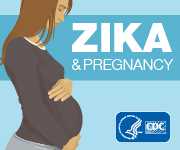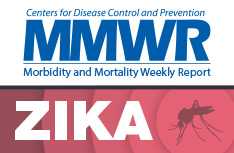Zika in Infants & Children
Congenital and Perinatal Transmission
Zika virus can be transmitted from a pregnant woman to her fetus during pregnancy (congenital transmission) or around the time of birth (perinatal transmission).
Congenital or intrauterine transmission of Zika virus occurs when a woman is infected with Zika virus during her pregnancy, but before delivery, and the virus passes to the fetus.
Perinatal transmission of Zika virus occurs when a woman is infected with the Zika virus within approximately 2 weeks of delivery, and the virus passes to the infant at or around the time of delivery. When an infant acquires Zika virus infection perinatally, the infant may develop symptoms such as maculopapular rash, conjunctivitis, arthralgia, and fever. We do not know how often perinatal Zika transmission occurs.
Information on perinatal transmission is limited to rare cases. An asymptomatic case and a symptomatic case (with thrombocytopenia and a diffuse rash) have been reported. Evidence from other flaviviruses, such as West Nile virus and dengue virus, indicate that transmission has resulted in findings in the neonate ranging from no symptoms to severe illness (including fever, thrombocytopenia, hemorrhage, encephalopathy, and adverse neurologic outcomes). The spectrum of clinical features that might be observed in infants who acquire Zika virus during the perinatal period is currently unknown.
Postnatal Transmission
Infants and children can acquire Zika virus postnatally via other routes of transmission, such as mosquito bites. Information on long-term outcomes among infants and children with postnatal Zika virus disease is limited. Most children infected with Zika virus are asymptomatic or have mild illness, similar to the findings seen in adults with Zika virus infection. Until more evidence is available to inform recommendations, routine pediatric care is advised for these infants and children. Treatment is supportive; this includes rest and fluids to prevent dehydration. Non-steroidal anti-inflammatory drugs (NSAIDS) should not be used until dengue is ruled out as a cause of illness and should be avoided in children aged <6 months. Aspirin is not recommended for use with postnatal viral illnesses because of the risk of Reye’s syndrome. Information on long-term outcomes among infants and children with postnatal Zika virus disease is limited.
Breastfeeding
Zika virus has been identified in breast milk, but infant Zika virus infection associated with breastfeeding has not been reported. Current evidence suggests that the benefits of breastfeeding outweigh the theoretical risk of Zika virus infection transmission through breast milk. CDC encourages mothers with Zika virus infection and mothers living in areas with ongoing Zika virus transmission to breastfeed their infants.
Guillain-Barré Syndrome
In general, the risk for GBS from any cause appears to increase with increasing age. GBS has been reported following Zika virus infection, although a causal link has not been established. It is unclear how often GBS following Zika virus infection has occurred in children; one report from Brazil refers to 6 patients, aged 2–57 years, with neurologic syndromes (4 with GBS and 2 with acute disseminated encephalomyelitis) after laboratory-confirmed Zika virus infection. Deaths due to Zika virus infection appear to be rare at all ages.
More Information
- Global Strategy for Infant and Young Child Feeding (WHO & UNICEF)
- Preventing Transmission of Zika Virus in Labor and Delivery Settings Through Implementation of Standard Precautions — United States, 2016 (MMWR, March 25, 2016)
- Zika virus and birth defects – Reviewing the evidence for causality (NEJM, 2016)
- Projecting Month of Birth for At-Risk Infants after Zika Virus Disease Outbreaks (EID, May 2016)
- Page last reviewed: April 27, 2017
- Page last updated: April 27, 2017
- Content source:





 ShareCompartir
ShareCompartir